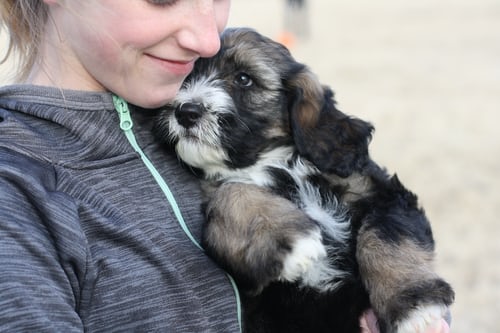COVID-19 has unleashed a flurry of challenges for pet owners, both new and old. One of the biggest challenges is providing proper socialization for young puppies while still social distancing. The first three months of a puppy’s life is a critical period for social development, and has a monumental impact on how it will interact with the world for the rest of its life.
To get some advice on this subject, we enlisted the help of a qualified professional. We met (virtually!) with Meaford’s positive reinforcement trainer, Jodie Hawker of Happy Paws Canine Solutions to get some pointers for keeping puppies safely socialized throughout the pandemic.
Basic Training
Keeping up with basic training early in life is essential to developing a well rounded pup. Begin by teaching your puppy basic cues such as sit, stay down, come, and leave it. This will help to build a benevolent relationship between you and your puppy.
It is always best to train with the help of a certified dog trainer. Dog training is not currently considered an essential service, so those eager to train may have to wait until restrictions are lifted, however many trainers are making the best of the situation by offering online classes.
Surfaces and Objects
Spend time exposing your puppy to things they will see in the real world, such as bicycles, hats, umbrellas, sunglasses, and more. Dress up in different outfits while around the home, then go about your normal day. While it may feel silly, this simple act can quickly teach your puppy not to fear things around it.
During walks, it’s equally important to expose young dogs to a variety of surfaces. This could be sidewalks, concrete, ramps, tiles, bridges, stairs, and more. Getting your puppy to be comfortable walking on all sorts of textures at different elevations early on will make outdoor time much more pleasant in the future.
Sounds
It is necessary for puppies to become familiar with the many sounds of the world so that they’re not overwhelmed and anxious as they grow older. Fire truck sirens, construction vehicles, thunderstorms, and vacuums are examples of commonly unpleasant noises your dog should grow accustomed to. Additionally, work on knocking on the door or ringing the doorbell. Have a partner or family member do so, and work with your puppy to resist the urge to bark or charge towards the door. Use tasty training treats as a worthy distraction when needed.
To desensitize and normalize these sounds, play them at home in the background using YouTube videos, or take your dog for frequent walks in more traffic-dense areas. Consider using training treats (and tons of praise!) to make these experiences as pleasant as possible for your pooch.
Car Ride
Car rides can become a big source of stress and anxiety for pets. Short trips in the car can help puppies become more comfortable with the experience. It’s important for your puppy to know that car rides are for more than just scary trips to the vet! Consider bringing your puppy on short trips to the gas station, or drive to a nice hiking trail. Pets should never be left unattended in a vehicle.
Handling & Touching
It is important for your puppy to get used to their body parts being touched. This will go a long way towards reducing or eliminating anxiety during baths, grooms, vet visits, and more. When petting your puppy, softly and slowly spend time touching areas such as the feet, ears, and tail. Using tasty treats as a distraction can make this experience more pleasant.
Alone Time
Learning how to spend time alone is important for dogs of all ages. Dogs are pack animals; they tend to want to be near others all the time. This can lead to unwanted behavioural problems like separation anxiety. This can lead to destructive behaviours, and often makes for a difficult setting when you need to leave the home for things like work or errands.
Begin by designating a safe place in your home for your puppy, such as a crate or a small puppy-proofed room. Start off by leaving your pooch alone for short durations, slowly increasing over time.
Use small training treats such to make the experience more enjoyable for your puppy. Also consider stuffed enrichment treats, such as a kong, to keep them distracted. This allows a stressed dog to focus their energy on something constructive, teaching good behavioural habits while alone.
Developing Social Etiquette
Once your puppy is vaccinated, it’s essential for them to meet other dogs in a safe and friendly environment. Proper social etiquette is developed through positive interactions with other dogs.
Doggy daycares are considered an essential service, and offer an ideal setting for supervised, controlled, and positive play. Environments like these will help your puppy develop those essential interaction skills needed for life.
If at any time you feel your puppy is scared or stressed while working on these above-mentioned techniques, take a break. Patience is key; if we force our dogs beyond their comfort zone, they may begin to develop negative associations, and we certainly don’t want that. Take a break and resume when your pup is calm and relaxed.
For more help with developing positive canine social skills, consider talking to a positive reinforcement dog trainer for customized advice and support. You can reach Jodie at happypawscaninesolutions@gmail.com
Brandon Forder, known as The Pet Expert, is vice-president of Canadian Pet Connection, an industry leader in healthy pet lifestyles. Brandon is certified in pet nutrition, and has more than twenty-five years’ experience specializing in pet health and behaviour. He has written hundreds of informative pet-related articles for newspapers, magazines, radio, and the popular Ask the Pet Expert Blog. Brandon is highly skilled in pet problem solving, and enjoys teaching others about smart and responsible pet ownership. To learn more, visit www.CanadianPetConnection.ca.












